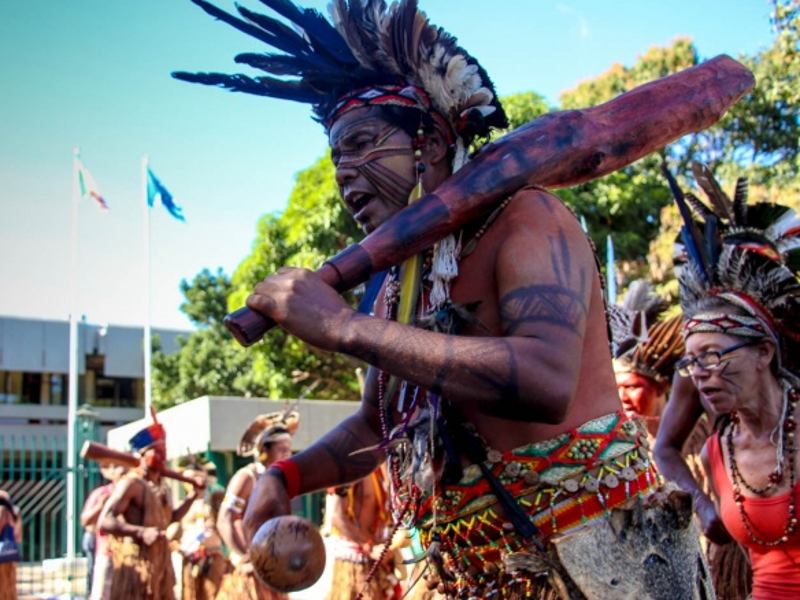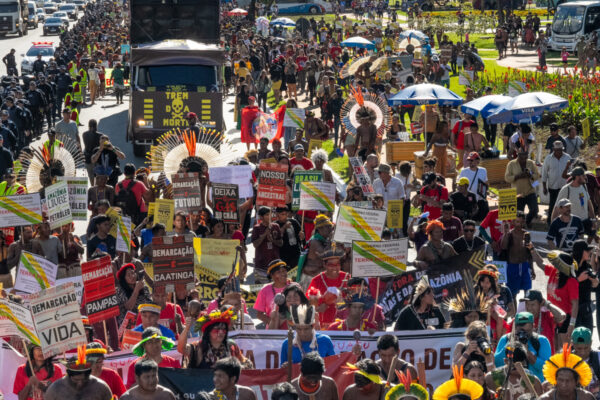
Last week’s indigenous mobilization in Brasilia – detailed in the following blog from the Socio-Environmental Institute (ISA) – came as a response to the current, alarming and mounting assault on the rights of Brazil’s indigenous peoples. This assault, which is manifesting both through attacks on institutional rights and through direct, physical violence and intimidation is driven primarily by the country’s powerful agroindustrial sector and its well-organized “ruralista” congressional caucus. The ruralistas are in turn backed by a cabal of agricultural industry groups whose financial power stems from the export of commodities such as soy, sugar, and beef to international traders and ultimately international consumers.
The Brasilia protest articulated an appeal from indigenous leadership to national governments via their Brazilian embassies, demanding that these countries instate a moratorium on importing such commodities until these brazen attacks on indigenous rights, lands, cultures, and security are to cease.
Around 160 indigenous people from various regions of the country, and primarily from Bahia, protested the last week in front of numerous embassies in Brasilia. Their goal was to draw attention of the international community, especially the big buyers of Brazilian agricultural commodities, pointing out the vulnerability of Brazil’s indigenous peoples and the link between agricultural production, the purchase of commodities by other countries, and the violation of the indigenous people’s rights in Brazil. The group presented a letter (see below) to embassies such as Portugal, Russia, USA, Holland, Canada and France.
“By importing products originating from Brazilian agribusiness, we understand that [the international community] contributes to the strengthening of that sector and, consequently, to the maintenance of the attacks, violence and [rights] violations that we suffer,” affirmed the letter written by the indigenous representatives and submitted to embassies.
“Exporting [commodities] helps to finance agribusiness, therefore it finances the genocide of our peoples, it finances the shootings that attack and wound our leaders, and in fact finances the murder of our people,” said Kâhu Pataxó, executive secretary of the Indigenous Federation of the Pataxó and Tupinambá Nations of the Extreme South of Bahia (Federação Indígena das Nações Pataxó e Tupinambá).
“This is is an attempt to seek external support, a cry for help to demonstrate that this form of [agricultural] production and of violation of indigenous rights is happening here in Brazil, and even worse, it is generating [agricultural] products commercialized elsewhere,” siad Thiago Anacé, coordinator of the Organizations of Indigenous Teachers of Ceará (Organizações dos Professores Indígenas). “Could it be that end consumers really know how the products they purchase are produced here in our country? How many indigenous lands are being invaded, rights violated?” he asked.
The letter contains complaints of attacks against indigenous peoples, such as those attempted against the Guarani Kaiowá in the state of Mato Grosso do Sul. Last month, a violent attack led by farmers in the Indigenous Land of Dourados-Amambaipegua I left an indigenous leader dead and five other wounded.
Besides the cases of violence, the indigenous protestors denounced legislative maneuvers that threaten their rights. “They [the ruralista congressional bloc] have designed a strategic process, forwarding Constitutional Amendments (PECs) PECs and proposing bills that eliminate our constitutional rights, and others that don’t eliminate them directly, but open gaps,” claimed Kâhú Pataxó.
The group of indigenous leaders remained in Brasilia through the week, attending meetings with governmental agencies in order to put forward demands related to landholding regularization and social rights, in addition to staging other actions meant to draw attention on their combat.
Letter to Embassies from the Indigenous Peoples of Bahia
Brasília/DF – July 5, 2016
Esteemed Ambassador –
We indigenous peoples of Bahia (Pataxó of Extreme South, Tupinambá of Belmonte, Tupinambá of Olivença and Tumbalalá) are reunited here in Brasilia, from the 3rd until the 8th of July 2016, in order to reflect upon the current indigenous situation in the country and take action to ensure our rights, so arduously conquered and now so greedily desired by Brazilian agribusiness, that sees our lands as the last barrier for the development and finalization of its projects, and hence sees us as obstacles for such devastating development. We understand that our rights are under intense and violent attack. From the 25 paramilitary attacks carried out against the Guarani Kaiowá in less than one year, in the State of Mato Grosso do Sul, to the evictions against the Pataxó communities in the extreme south of the State of Bahia, the murders and imprisonment of leaders of the Tupinambá people in the south of Bahia, and Proposed Constitutional Amendment 215 (PEC 215/00) that is being considered in the National Congress, our rights are under recurrent and intense attack.
The advancement of PEC 215/00, of the proposed law 1610/96 and other anti-indigenous legal proposals aren’t the result of the initiative of some unconventional parliamentarian. There are political and economical interests at the root and stem of these attacks against our peoples and our rights. The responsible parties and direct beneficiaries of these attacks are the same political and economical subjects. All those related to and advocating for [these attacks are reliant upon] a model of exploration and production that is fundamentally based on the exportation of agricultural and mineral commodities.
Proof of this assessment can be found in the document “Positive Agenda – Biennium 2016/1017” (Pauta Positiva – Biênio 2016/2017), published jointly by the Agricultural Parliamentary Front (Frente Parlamentar Agropecuária) and the Institute for Agricultural Thought (Instituto Pensar Agropecuária), that convenes 38 national and regional associations of producers of agricultural commodities.
The associations that compose the Institute for Agricultural Thought work astutely to promote the exportation of their products.
Many of countries import the commodities produced by this sector, despite the fact that this industry is extremely aggressive towards human rights, and is especially aggressive and violent against our people and leaders. By importing products originating from Brazilian agribusiness, we understand that [the international community] contributes to the strengthening of that sector and, consequently, to the maintenance of the attacks, violence and [rights] violations that we suffer.
Given this situation, we have com to this Embassy asking that your country stops buying agricultural products originating in Brazil, especially those from this sector that uses such deceptions and tricks, harms our communities, producing products that have the “taste of indigenous blood”, just as many of them are linked to slave labor. We suggest that you contact the representatives of the Institute for Agricultural Thought (IPA), the Associations of Producers of the respective imported commodities, the Agricultural Parliamentary Front, the National Agriculture Confederation (CNA), and the Federation of Rural Unions to which it is linked, in order to establish a moratorium on [commodity] importation, conditioning future acquisitions of those products to the immediate change of posture and political actions of those sectors in relation to our rights, our people and leaders. We call upon your country: Do not contribute to the theft of our lands, and to the imprisonment and death of our leaders.
Best regards,
Caciques and Leaders
Translated by Ana Kuhn













